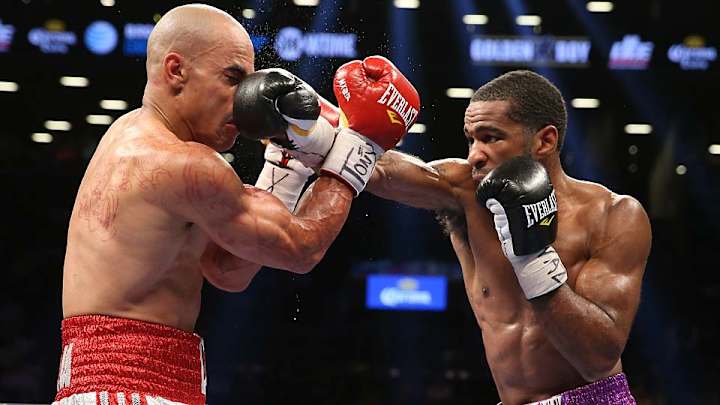Instead of thriving, boxing continues to be its own worst enemy

Boxing is a fantastic sport. It’s athletes are amongst the world’s most colorful -- fighters from all over the globe, from all walks of life, many of whom have risen from the darkest of childhoods to succeed beyond their wildest dreams. Lamont Peterson going from homeless to world champion. Daniel Jacobs overcoming cancer to return to the top of his division. Never been to a big fight? The atmosphere in the moments before the opening bell is electric, comparable to the buzz before the kickoff of the Super Bowl or the opening tip of Game 7 of the NBA Finals.
The sport should be thriving. Unfortunately, it’s not.
Boxing has become its own worst enemy, and last weekend provided a handful of all too familiar examples. In New York, Showtime televised a tripleheader featuring young rising stars in Peterson, Jacobs and Danny Garcia. The problem? None of them fought anyone of consequence.
Jacobs, fighting for a minor piece of the middleweight title, took on unheralded Jarrod Fletcher of Australia. Jacobs destroyed Fletcher in five rounds.
Next, Peterson defended his 140-pound title against journeyman Edgar Santana. Peterson battered Santana over 10 uncompetitive rounds before Santana’s corner mercifully threw in the towel.
SI 60: 'Lawdy, Lawdy, He's Great'
In the main event, Garcia, the unified junior welterweight champion, took on Rod Salka, a pedestrian 135-pound fighter moving up to fight Garcia at a 142-pound catchweight. In the weeks leading up to the fight, the Garcia-Salka pairing drew the most criticism, with virtually everyone predicting a Garcia blowout. They were right: Garcia knocked Salka down three times en route to a laughable second-round knockout.
Under Executive Vice President Stephen Espinoza, Showtime has emerged as a formidable presence in boxing, sinking significant resources into its programming. The network hired the estimable Brian Kenny to serve as a show host and to play traffic cop on pre- and post-fight panels that add measurable value to the broadcast. The company has poured millions into a budget that is now comparable -- if not exceeding -- to rival HBO’s. A spot on Showtime’s Championship Boxing series should be prime real estate.
Saturday night was a waste of it. Peterson should have been fighting Garcia. Both were coming off wins in the first quarter of the year and both have publicly stated that they were looking for big fights. A Garcia-Peterson unification fight would have generated significant interest. Instead, viewers were left to watch both fighters easily dispatch opponents that had no business being in the ring with them.
Jacobs vs. Fletcher wasn’t as widely panned before the fight. Jacobs was five fights into a comeback from a shocking cancer diagnosis that nearly killed him. Fletcher was riding a six-fight winning streak, albeit against lesser competition. What was absurd was the suggestion that the fight was for the WBA middleweight title. Just two weeks earlier, Gennady Golovkin successfully defended the WBA title in a knockout win over Daniel Geale. But the WBA, which hands out titles like business cards, has three titleholders in the 160-pound division, Golovkin (super), Jacobs (regular) and Dmitry Chudinov (interim).
With four major sanctioning bodies, it’s already challenging for the casual fan to keep track of the champions. When one body waters it down even further in a shameless attempt to collect sanctioning fees, it makes the sport look ridiculous.
That same night, in Pennsylvania, another recurring problem re-emerged. Heavyweight contender Vyacheslav “Czar” Glazkov -- a 2008 Ukrainian Olympian being groomed for an eventual title shot -- found himself in a tougher than expected battle with Derric Rossy, a 34-year old former Boston College defensive lineman who had lost two of his last three fights. A surprisingly active Rossy appeared to win many of the early rounds, and despite fading in the final two, looked to be in position to win the fight.
Two judges thought so. John Poturaj scored it 95-95, a draw. Ron McNair had it 96-94, Glazkov. Incredibly, judge Pierre Benoist scored the fight 98-92 for Glazkov, an absolutely brutal display of judging that cast a dark shadow over an entertaining fight. That scoring changed the post-fight narrative. Instead of the story being Rossy, an easygoing big man who turned his career around this year after making the decision to quit his day job as an iron worker and focus solely on boxing, it was the continued incompetence of far too many judges in the sport.
For Rossy, it’s worse. Instead of a possible rematch with Glazkov, which would come with a bigger payday, his future is uncertain.
“It’s hard to get the words together,” Rossy told me after the fight. “You’re messing with people’s livelihoods. You are messing with people’s dreams. I don’t think [judges] get the immensity of being a judge. That is the most vital part of boxing...I know I won at least six of those rounds. You have to wonder, where is the accountability? Ultimately, you have dreams destroyed.”
For a sport that badly needs to connect with a mainstream audience, weekends like this only pull it further away. Boxing beat writers at newspapers are all but extinct, and most don’t cover the sport at all. Sports Illustrated, which once routinely slapped boxers on the cover, has not published a boxing one since Oscar De La Hoya and Floyd Mayweather in 2007. Boxing coverage is centralized on boxing specific websites, which is great for the dedicated fans but doesn't do much to reach the casual ones.
To draw those fans in, boxing needs compelling matchups and fair judging. Last weekend, it provided neither.
